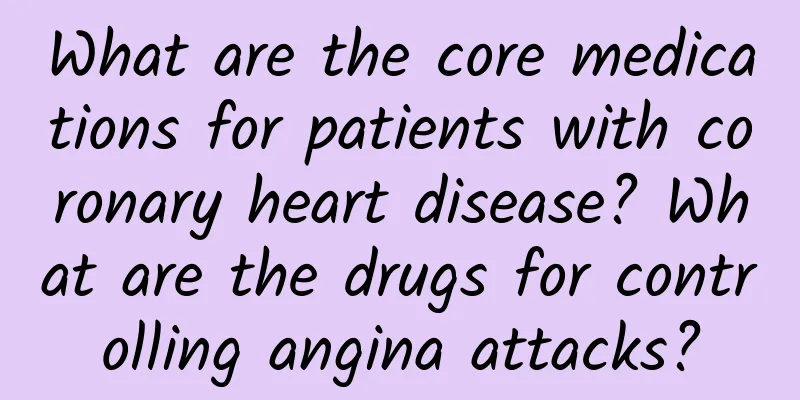What are the core medications for patients with coronary heart disease? What are the drugs for controlling angina attacks?

|
A patient with coronary heart disease told Huazi that since the weather turned cold, his angina attacks have become more frequent. What should he do? The doctor told him to take several kinds of medicine. He was worried that taking too many medicines would cause more adverse reactions. Could he reduce some of the medicines? Hua Zi said that this patient's thoughts represent the psychology of most patients, who want to control their condition but are also worried about adverse drug reactions. This idea is understandable, but the treatment of coronary heart disease basically requires the combination of multiple drugs to play an effective therapeutic role. We must distinguish the importance of drugs and cannot stop using core drugs. 1. Correctly understand the dangers of coronary heart disease. The full name of coronary heart disease is coronary atherosclerotic heart disease, which refers to the atherosclerosis of the coronary arteries that supply blood to the heart. The hardened plaques cause the degree of arterial stenosis to exceed 50%. The heart does not get enough blood supply and suffers symptoms of ischemia, hypoxia, and even necrosis. The biggest danger of coronary heart disease is the rupture of unstable plaques. If plaques rupture, platelets will aggregate and form thrombi, which will then block blood vessels. Therefore, the treatment of coronary heart disease must take into account multiple treatment goals, such as preventing disease progression, stabilizing plaques, avoiding rupture, and improving symptoms. It requires the combined use of multiple drugs. 2. The core medication for coronary heart disease cannot stop the formation of atherosclerotic plaques, which is closely related to the level of low-density lipoprotein cholesterol (LDL-C) in blood lipids. Lowering the level of LDL-C can effectively inhibit the progression of the disease. For patients with coronary heart disease, the LDL-C level needs to be controlled below 1.8mmol/L. The drug that lowers the LDL-C level is statins, which is the first core medication for coronary heart disease. Statins can inhibit cholesterol synthase, reduce the production of LDL-C, and lower the level of LDL-C. Statins also have multiple effects such as improving arterial intima metabolism, inhibiting inflammatory response, and inhibiting LDL-C oxidation. Long-term use may also reduce the size of plaques, increase their density, and transform unstable plaques into stable plaques that are less likely to rupture. Antiplatelet drugs, represented by aspirin, are the second core medication for patients with coronary heart disease. Because the plaques of patients with coronary heart disease are large and unstable, they may rupture at any time. Antiplatelet therapy is needed to inhibit platelet aggregation. Aspirin can irreversibly inhibit platelet aggregation, but the body's platelets are renewed at about 15% every day, so continuous medication for antiplatelet therapy is required to prevent thrombosis. If the drug is discontinued for more than 48 hours, the anti-thrombotic effect will disappear, so aspirin needs to be taken every day without interruption. 3. Medication for angina control Because the narrowed coronary arteries cannot meet the increased oxygen consumption of the heart, the heart will experience ischemia and hypoxia during activities, and angina will occur. Symptoms include chest pain, precordial pain, chest tightness, and pharyngeal tightening. There are also atypical angina pectoris, which can manifest as abdominal pain, left arm pain, left shoulder pain, back pain, and even toothache. Nitroglycerin, Quick-acting Heart-saving Pills: When angina pectoris occurs, nitroglycerin tablets are the first choice. Place it under the tongue and take it. Symptoms usually ease within a few minutes. If it does not ease, take the second tablet after 5 minutes. If it still does not ease after taking three tablets, it may be a myocardial infarction, and you need to call "120" for emergency treatment immediately. Nitroglycerin can cause low blood pressure, so it is not suitable for people with low blood pressure or hypertrophic cardiomyopathy. If you cannot take nitroglycerin, you can choose quick-acting heart-saving pills. Long-acting nitrate drugs: Nitroglycerin has a short duration of action. For people with frequent angina attacks, long-acting nitrate drugs can be used to prevent attacks, such as isosorbide dinitrate, isosorbide mononitrate, etc. However, nitrate drugs will produce tolerance, and the efficacy will decrease rapidly after continuous administration. It is important to take the medicine at the interval specified in the drug instructions and do not use it continuously in a short period of time. Nicorandil: Nicorandil belongs to the nitrate compound, but its mechanism of action is different from that of nitrate drugs. When dilating coronary arteries, it does not affect blood pressure, heart rate, myocardial contractility and myocardial oxygen consumption. Lolamine drugs: Commonly used drugs include metoprolol and bisoprolol, which can inhibit cardiac excitability, reduce heart rate, reduce myocardial oxygen consumption, and prevent angina attacks. When using Lolamine drugs, the ideal resting heart rate range is to control it within 55 to 60 beats per minute, which can reduce the risk of cardiovascular disease. Calcium channel blockers: Commonly used are dihydrotestosterone (such as nifedipine, amlodipine, etc.) and non-dihydrotestosterone (such as diltiazem, verapamil, etc.). They can inhibit the entry of calcium ions into the myocardium and vascular smooth muscle cells, reduce myocardial contractility, and reduce cardiac oxygen consumption. However, dihydrotestosterone may reflexively cause an increase in heart rate, while non-dihydrotestosterone can reduce heart rate, so the latter is more suitable for the treatment of coronary heart disease. Trimetazidine: It can improve the metabolism of myocardial cells in an oxygen-deficient environment and maintain the stability of the internal environment of myocardial cells. It is usually used for patients who still have angina pectoris after their blood pressure and heart rate are under control. To sum up, there are two main core drugs for the treatment of coronary heart disease, one is statins, and the other is antiplatelet drugs represented by aspirin. Both need to be taken consistently and cannot be stopped. There are many drugs to control angina pectoris. Nitroglycerin is the first choice for acute attacks. Other drugs are used for daily prevention and should be selected by doctors according to different conditions of patients. If you have any questions about medication, please consult a doctor or pharmacist. I am pharmacist Huazi. Welcome to follow me and share more health knowledge. |
<<: What is the origin of pizza? Why is pizza called pizza?
Recommend
Treatment of placental abruption
Premature placenta is a relatively serious proble...
How long in advance should folic acid be taken?
Many female friends will take folic acid tablets ...
Read this article to learn how to prevent adverse reactions caused by hormones!
Although glucocorticoids can cause many adverse r...
17 weeks pregnant lower abdomen pain
At different stages of pregnancy, pregnant women ...
What causes wrinkles? How can we effectively prevent wrinkles?
In the daily skin care and maintenance, women age...
What is the order in which facial wrinkles appear? Classification of wrinkles
In the eyes of ordinary people, as we age, collag...
38 weeks of pregnancy labor signal second child
The birth is basically imminent when the pregnanc...
What are the dietary treatments for ovarian cysts?
Ovarian cysts are the main threat to the health o...
Preventive methods for leucorrhea in early pregnancy
When women are pregnant, they must protect themse...
What are the symptoms of mammary duct ectasia?
Once a woman's mammary ducts dilate, plasma c...
How to correct breast expansion and sagging
The problem of sagging breasts in women has becom...
How to calculate ovulation period when menstruation occurs every two months
How to calculate the ovulation period most accura...
How is the quality of blastocyst 4bb
After obtaining the test tube embryo grade result...
What should I do if my lower abdomen feels heavy during menstruation?
When you have your period, you may feel a heavine...
Why are the labia majora red and swollen?
The female private parts are composed of many par...









